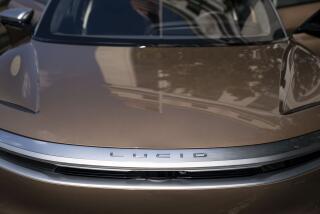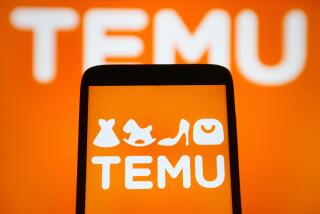Activist Fills in Lawmakers on China Prison-Labor Suit
WASHINGTON — A Los Angeles area company owned by the Chinese government has been importing automobile parts manufactured in a Chinese prison in apparent violation of U.S. law, according to previously undisclosed court testimony made public Thursday by human-rights activist Harry Wu.
The company, MM Rotors, a subsidiary of China National Minerals & Metals Corp., is currently being sued in U.S. District Court in Los Angeles for violating the 1932 Smoot-Hawley Act and anti-dumping statutes that prohibit the importation of products made by forced labor.
American companies that previously purchased MM Rotors’ products--many of which were found to be defective--include Midas Muffler Co., Monroe Motor Parts and Autocraft, according to court documents.
In addition, Wu said Chinese government records show that these prison-made parts also are being used in the Beijing Cherokee, manufactured in a joint venture with Chrysler, and the Shanghai Santana, produced in a joint venture with Volkswagen.
Reached by telephone at his City of Industry office, Ru Jun Yan, an official of MM Rotors, denied that the brake drums, hub rotors and brake discs imported by his firm are made by prison labor.
“That is completely nonsense,” he said.
But in testimony taken last month in the court case, a former corporate customer of MM Rotors disclosed that during a December 1993 visit to China, he had observed prisoners at the Lin Fen Prison in Shanxi Province manufacturing the company’s product.
When asked how he knew the foundry he visited was a prison, Xiang Li, an engineer currently living in Milwaukee, testified: “Because I am Chinese, and I read the sign by the gate. It says, ‘Lin Fen Prison.’ And also it was guarded by uniformed guards.”
Wu, who served 19 years in a Chinese prison camp before he came to the United States in 1985, brought the court testimony to light during a hearing of the House International Relations Committee. He said the case “is further evidence that the Chinese government has no intention of preventing the export of laogai [labor camp] goods.”
In an attempt to dissuade Congress from renewing trade preferences for China, Wu has recently stepped up his effort to call attention to unpublicized examples of products manufactured with forced labor that are being exported to the United States by China.
On Thursday, Wu testified that the MM Rotors case could have been prevented if the Clinton administration had enforced an agreement signed in March 1994, in which China agreed to allow scrutiny of factories suspected of using forced labor.
“If we ignore our law,” he said, “it means we are willing to enjoy the products made by Chinese blood and tears. We cannot forget our principles. . . . If we care only about money and not human suffering, then we insult our traditions.”
MM Rotors imports tons of auto parts from China each year, according to Wu. He cited, as an example, records of one February 1994 shipment in which MM Rotors received 161,500 brake drums, hub rotors and brake discs from its Chinese-government-owned parent company.
MM Rotors and a related company, Minmetals Inc., both located in the City of Industry, are being sued for damages in two separate cases filed by the bankruptcy trustee for a now-defunct Illinois auto parts company, Excel Industries Inc. In 1994, Excel became a distributor of the Chinese-made parts. The cases were brought in response to an earlier MM Rotors suit seeking $180,000 in unpaid debts from Excel.
According to the Excel suits, the company opted to distribute MM Rotor products after its own product could no longer compete with the low-priced goods being imported from China. But Excel was forced into bankruptcy in 1996 after many Excel customers complained that the MM Rotor parts were defective.
Prior to becoming a distributor for MM Rotors, according to court documents, Excel sent two employees--executive vice president Peter Arenson and Xiang, a native Chinese engineer--to visit the factory where the parts were made.
It was on that trip, according to Xiang, that he realized the parts were being made in a prison. He said he and Arenson were told explicitly by company officials that MM Rotor’s parts were being manufactured in this facility.
Excel’s attorney, Philip Heller of Los Angeles, contends in his suit that MM Rotors later pledged that it would supply Excel with quality products that would be consistent with U.S. law barring goods manufactured by prison labor. He accused MM Rotor of defrauding Excel on this agreement.
“The true facts were that the goods provided by MM Rotors were not manufactured with precision and care, but poorly and defectively,” the suit charged. “Relatedly, many of the parts were manufactured using prison labor.”
When Excel complained about the quality of the products, MM Rotors persuaded Excel to continue distributing the parts by promising a capital infusion of at least $15 million into a possible joint venture between MM Rotors and Excel. But the joint venture was never consummated, and Excel went bankrupt.
Although Xiang said he recognized the manufacturing facility in China as a prison in December 1993, Excel’s suit said it did not discover until September 1995 that the products it was receiving from MM Rotors were being manufactured by forced labor.
In response to the suits, China Metals, the parent company headquartered in China, has claimed sovereign immunity from U.S. court proceedings because it is an agency of the Beijing government. Excel charges that China Metals is trying to escape liability by hiding behind MM Rotors, which has no money.
In Wu’s testimony, he called upon Chrysler and Volkswagen to stop using the auto parts they receive from the prison in Shanxi Province. He also called on the U.S. government to deport the top officials of MM Rotors and to step up Customs Service enforcement of laws prohibiting the importation of prison-made goods.
More to Read
Inside the business of entertainment
The Wide Shot brings you news, analysis and insights on everything from streaming wars to production — and what it all means for the future.
You may occasionally receive promotional content from the Los Angeles Times.









